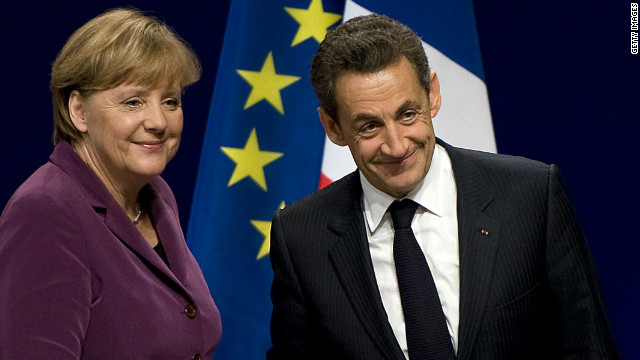
- Bets against the bonds of eurozone countries represent a new level of bearishness
- Funds anticipate a Hollande victory and deterioration of France's creditworthiness
(Financial Times) -- Hedge fund managers make for unlikely supporters of François Hollande, the French socialist presidential candidate.
But it is Mr Hollande's potential victory in the coming second round of the French elections, and with it a sharp deterioration in sentiment surrounding France's creditworthiness in the bond market, that many hedge funds are now anticipating.
Indeed, their bets against the bonds of "core" eurozone countries -- not just France, but Germany and the Netherlands too -- represent a new, deeper level of bearishness on the single currency area's prospects.
The European Central Bank's longer-term refinancing operation provided a huge shot in the arm to banks and markets in the first quarter of the year and triggered a huge rally in credit. But its impact is now being questioned by growing numbers of hedge funds.
"The deeper balance of payments problems in the eurozone remain unresolved, and cannot be resolved by liquidity assistance alone," noted Brevan Howard, Europe's biggest global macro hedge fund in its last letter to investors.
Though Brevan is not among them, a clutch of hedge fund managers, supposedly among the savviest investors around, are directly wagering that Europe's problems have become so entrenched that they will lead to a much more serious crisis in the coming months than the eurozone has experienced.
Among them is John Paulson, a hedge fund billionaire who enjoys the distinction of having both made and lost more money for his clients than any of his peers in the industry's history.
In a private call two weeks ago, Mr Paulson told his own investors that he foresaw a significant worsening in the European situation.
While Spain would be the epicentre of the crisis, however, core nations -- most notably Germany -- were those against whom Mr Paulson had positioned his portfolio.
The wager Mr Paulson and others are making is that, relative to the periphery, where much of the eurozone's immediate problems lie, it is the core of Europe that is mispriced.
Spain's downgrade by rating agency Standard & Poor's on Thursday evening, for example, pushed benchmark Spanish bond yields back above 6 per cent, but German Bunds remained relatively unaffected.
Hedge funds believe such a situation is unsustainable, and when problems for the Spanish banks become more acute -- possibly forcing a full-scale bailout for the Spanish government -- German Bunds will have only one way to go.
Part of the attraction of the trade is its asymmetry.
"The problem in trading eurozone sovereigns for the past two years hasn't been that we've been wrong, it's been the volatility in between," says the manager of one of the world's biggest macro hedge funds.
"If something like the LTRO comes along then it changes the sentiment in the market, if not the fundamentals. The attraction of betting against core bonds is that they're less affected by such positive swings in sentiment."
With Bund yields, which move inversely to prices, near all time lows, fund managers can meanwhile write credit default swaps, a form of protection against default, for very little so-called "carry", the cost of maintaining such a trade.
A bet against Germany, for example, costs just 86 basis points per annum based on current prices. Even if German CDS spreads returned to the levels they were at in December 2010 -- 121bp -- that would equate to a 40 per cent change in the position.
From where they are now, Spanish CDS would have to reach 660bp, a rise of 188bp, to produce the same effect.
To boot, Spanish bonds have plenty of upside risk in the event of a resolution, fleeting or permanent, to the country's difficulties. Few, in comparison, expect German CDS prices to dip substantially lower.
Underscoring such fears for the core of Europe is data from the ECB itself. While lending to the most severely hit peripheral economies -- Greece, Ireland and Portugal -- has stayed relatively stable the data show lending to Spanish and Italian borrowers has sharply increased, as has, crucially, lending to the core.
And such increased lending is increasing the linkages between the supposedly safer nations and those in the most trouble.
"[ECB] loans have helped to fund cumulated balance-of-payments deficits of the non triple-A rated countries versus the triple-A rated countries (Germany, Netherlands, Finland and Luxembourg)," Deutsche Bank analysts pointed out in a note for hedge fund clients earlier this month.
And yet, for all the certainty many hedge fund managers express about the outcomes of such imbalances, wagering money on them remains highly risky.
Mr Paulson's bet on Bunds, made at the beginning of the year, is not faring particularly well. Funds that have shorted the euro aggressively have, just as in 2011, been hit by the currency's resilience.
"[Hedge funds] got so badly burned trying to play eurozone fundamentals last year," notes Ben Funk, head of research at the $3bn fund of hedge funds Liongate. "So much liquidity is being pumped in by central banks around the world -- fundamentals be damned."
No comments:
Post a Comment